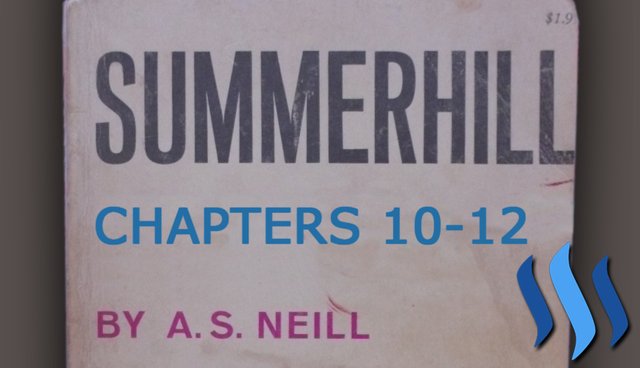Freedom Writers (and Actors and Athletes) - Summerhill Chapters 10-12

opening blurb
Welcome to the seventh blog entry of my read-through of the 1960 book, Summerhill. I will be going through the book chapter-by-chapter and posting a summary, quotes and my own insights on the content. I will try my hardest to write each blog entry so that it stands on its own—reading the book will not be a requirement, nor will reading any of the previous blog entries. Like yesterday's entry, today we'll be looking at three very short chapters.
SUMMERHILL
A Radical Approach to Child Rearing
By A.S. Neill
Part One: Summerhill School
Chapter 10: Theater
Students at Summerhill School were never forced to take part in school productions, but many did act in and write plays. Are you noticing a recurring theme in this series? Children do not need to be coerced into activity. Free children will naturally set their efforts and talents toward the things they enjoy.
At Summerhill, it was an unwritten rule that all plays must be written by the students. Only on rare occasions would they perform plays written by the staff, and even more rarely would they ever perform plays written by professionals. Anything written by a non student would only be considered for performance if there was a severe lack of plays written by the children themselves.
Even though there were no real rules about writing or content at Summerhill, there was a strong aversion to plagiarism. That reminds me a lot of Steemit. It isn't intellectual property laws that make us crack down on plagiarism, it's the fact that we all think we deserve a higher level of content than something lazily ripped from another source. Neill recounts a story where he once wrote a play inspired by themes from W. W. Jacob and the children labelled him a "copycat" and a "swindler."
Many of the children at Summerhill made fine actors. Neill discovered long ago that the worst actor is one who acts in life because such a person is overwhelmed with self-consciousness. This isn't as much of a problem at Summerhill since children are met with nothing but approval and affirmation.
And finally, we return to another recurring theme of the book: creativity and individuality. Neill writes:
Our theater has done more for creativity than anything else in Summerhill. [...] The children must realize, even if dimly, that their tradition of performing only original homegrown plays encourages creativity rather than reproduction and imitation.
(Chapter 10, page 70)
Summerhill is all about encouraging people to be themselves rather than raising them to be mindless automatons, doing nothing except following orders and instructions. This is reflected in their approach to the dramatic arts. Like Neill said, their method encourages creativity and not reproduction: individuality and not imitation.
Chapter 11: Dancing and Music
I'm going to begin this section with a long quote from the chapter:
On with the dance—but it must be danced according to the rules. And the strange thing is that the crowd will accept the rules as a crowd, while at the same time the individuals composing the crowd may be unanimous in hating the rules.
To me a London ballroom symbolizes what England is. Dancing, which should be an individual and creative pleasure is reduced to a stiff walk. One couple dances just like another couple. Crowd conservatism prevents most dancers from being original. Yet the joy of dancing is the joy of invention. When invention is left out, dancing becomes mechanical and dull. English dancing fully expresses the English fear of emotion and originality.
If there is no room for freedom in such a pleasure as dancing, how can we expect to find it in the more serious aspects of life? If one dare not invent his own dance steps, it is unlikely that he will be tolerated if he dares to invent his own religious, educational, or political steps!
(Chapter 11, page 71)
This quote perfectly explains what Summerhill wants to avoid at their school dances. No attempts are made to lead the children to "higher tastes" or better form. They are allowed to be happy and be themselves. To put it simply, they can just have fun.
This applies to music at Summerhill as will. Neill says that it doesn't matter one bit to a person's happiness if they love Beethoven or hot jazz. Many schools of the time would force children to only learn the classical and avoid the modern. At Summerhill, three boys who were very inspired by jazz took it upon themselves to learn musical instruments. Now (1960) they all play in orchestras which only play classical music.
The evolution doesn't represent a failure of individuality. Quite the contrary, Neill believes that this represents an advance in musical taste which was allowed to happen because at Summerhill each student was permitted to play and listen to whatever they wanted. Children allowed to freely grow will grow.
Chapter 12: Sports and Games
There isn't too much to say about sports at Summerhill that hasn't been said about every other subject. Yes, they are completely optional and yes, many children still participate.
Sports in Summerhill are in their proper place. A boy who never plays a game is never looked down upon and never considered an inferior. "Live and let live" is a motto that finds its ideal expression when children are free to be themselves. [...] Only under freedom to play or not to play can one develop true sportsmanship.
(Chapter 12, page 74)
Thank you for reading! Please follow me @sethlinson.
~Seth

CITATION
Neill, A.S. Summerhill: A Radical Approach to Child Rearing. New York City: Hart, 1960. Print.